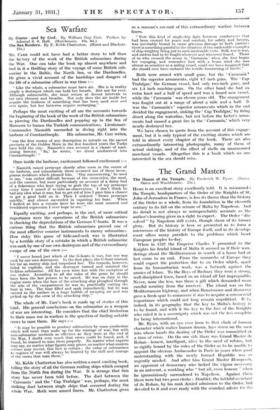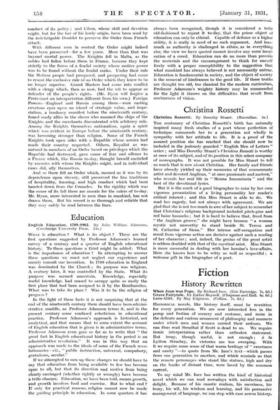The Grand Masters
HERE is an excellent story excellently told. It is misnamed : the Temple, headquarters of the Order of the Knights of St. John of Jerusalem in France, is less its theme than the history of the Order as a whole, from its foundation in the eleventh century to its fall on the seizure of Malta by Napoleon. And its detail is not always so unimpeachably accurate as the author's learning gives us a right to expect. The Order "dis- solved " by Napoleon still exists, though shorn of its former glory. But its history is here so presented as to form a microcosm of the history of Europe itself, and in its develop- ment offers many parallels to the problems width beset European peoples to-day.
When in 1527 the Emperor Charles V presented to the Knights his feudal island of Malta it seemed as if their wan- derings about the Mediterranean in search of a home had at last come to an end. From the monarchs of Europe they Could expect the protection due to an Order which, apart from its humanitarian work, was a bulwark against the armies of Islam. To the Beys of Barbary they were a strong, well-disciplined force, based on an island all but impregnable. Never, none the less, was there a gift which demanded more careful scrutiny from the receiver. The island was on the Mediterranean highway, and when Renaissance and discovery gave a fresh spur to commerce it was to acquire a commercial importance which could not long remain unpolitical. It is, indeed, in its geography that the key to Malta's history is to be found, and with it the key to the fate of the Knights who ruled it in a sovereignty which was not the less complete for being international.
Mr. Ryan, with an eye ever keen to that clash of human character which makes human drama, lays stress on the men into whose hands the destiny of the Order was committed at a time of crisis. On the one side there was Grand Master dc Rohan—honest, intelligent, alive to the need of reform, but so rigidly bound by the rules of the Order as to be unable to appoint the obvious Ambassador in Paris in years when good understanding with the newly formed Republic was 50 urgently needed. And after him Grand Master Hompeseh, an opponent of democracy who lacked the vigour necessary in an autocrat, a weakling who " lost all, even honour " when he ignominiously surrendered to Napoleon. Against them there were but two poor clerks : Doublet, the faithful secretary of de Rohan, by his rank denied admission to the Order, but devoted to it and ever ready with the soundest advice for th3
conduct of its policy ; and Cibon, whose skill and devotion might, but for the bar of his lowly origin, have been used by the indefatigable Doublet to preserve the Order from French attack.
With different men in control the Order might indeed have been preserved—for a few years. More than that was beyond mortal power. The Knights fell in Malta, as the nobles had fallen before them in France, because they kept strictly to the forms of a feudal society whose motive power was to be found without the feudal ranks. Under their rule the Maltese people had prospered, and prospering had come to resent the exclusive rule of an Order which they knew to be no longer superior. Grand Masters had come into conflict with a clergy which, then as now, had the wit to appear as defender of the people's rights. (Mr. Ryan will forgive a Protestant an interpretation different from his own.) Foreign Powers—England and Russia among them—were casting covetous eyes upon an island of strategic value, and impe- rialism, a tendency manifest before the nineteenth century, found ready allies in the slaves who manned the ships of the Knights and the merchants discontented with arbitrary rule. Among the Knights themselves nationalism, again a spirit which was evident in Europe before the nineteenth century, was becoming stronger than religion. Some of the French Knights took open sides with a Republic whose armies had made their country respected. Others, Royalist as was natural in members of an Order based on privileges which the Republic had destroyed, gave cause of fear and offence to a France which, like Russia to-day, thought herself encircled by enemies with whom the Knights might, and in individual cases did, ally themselves.
And so there fell an Order which, marred as it was by its dependence upon slavery, still preserved the fine traditions of hospitality, learning, and high conduct which had been handed down from the Crusades. In the rigidity which was the cause of its fall there are morals for the rulers of to-day. Mr. Ryan, more interested in men than in mankind, has not drawn them. But his record is so thorough and reliable that they may safely be read between the lines.







































 Previous page
Previous page